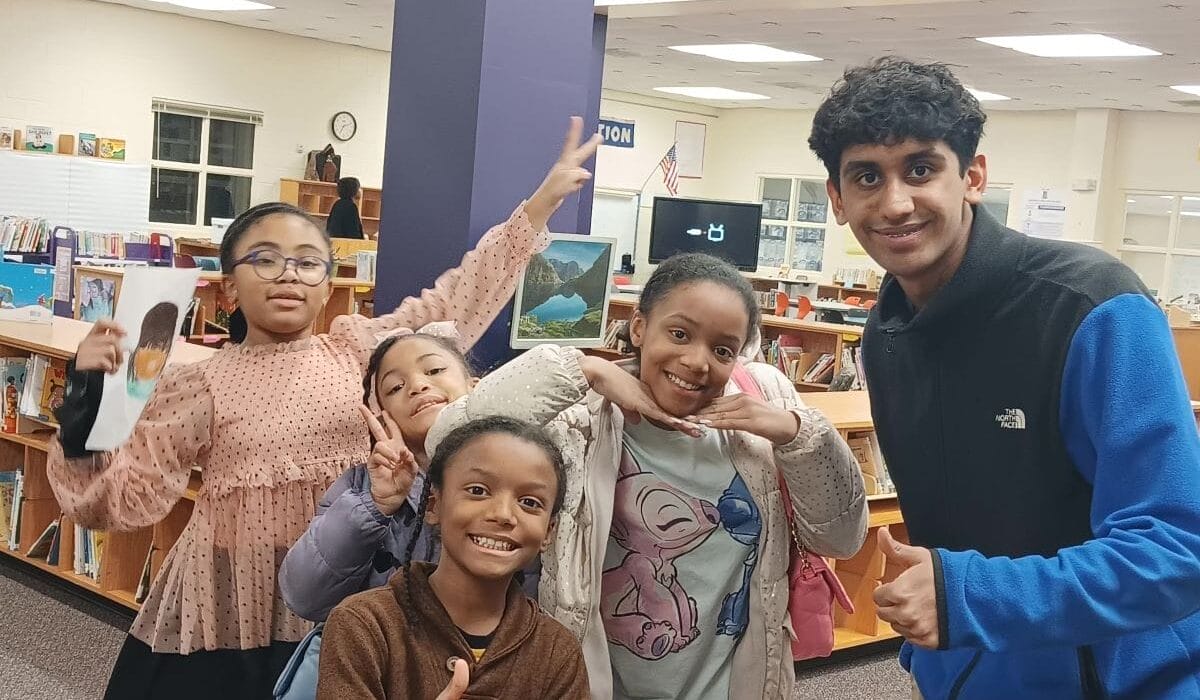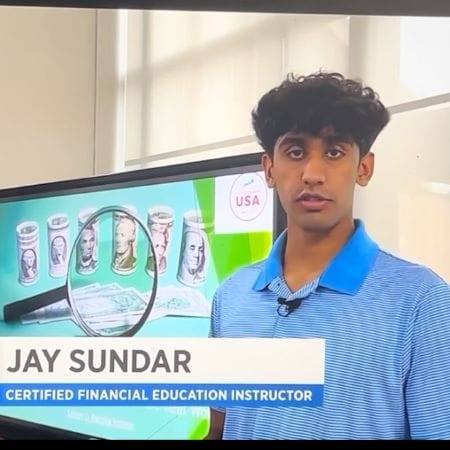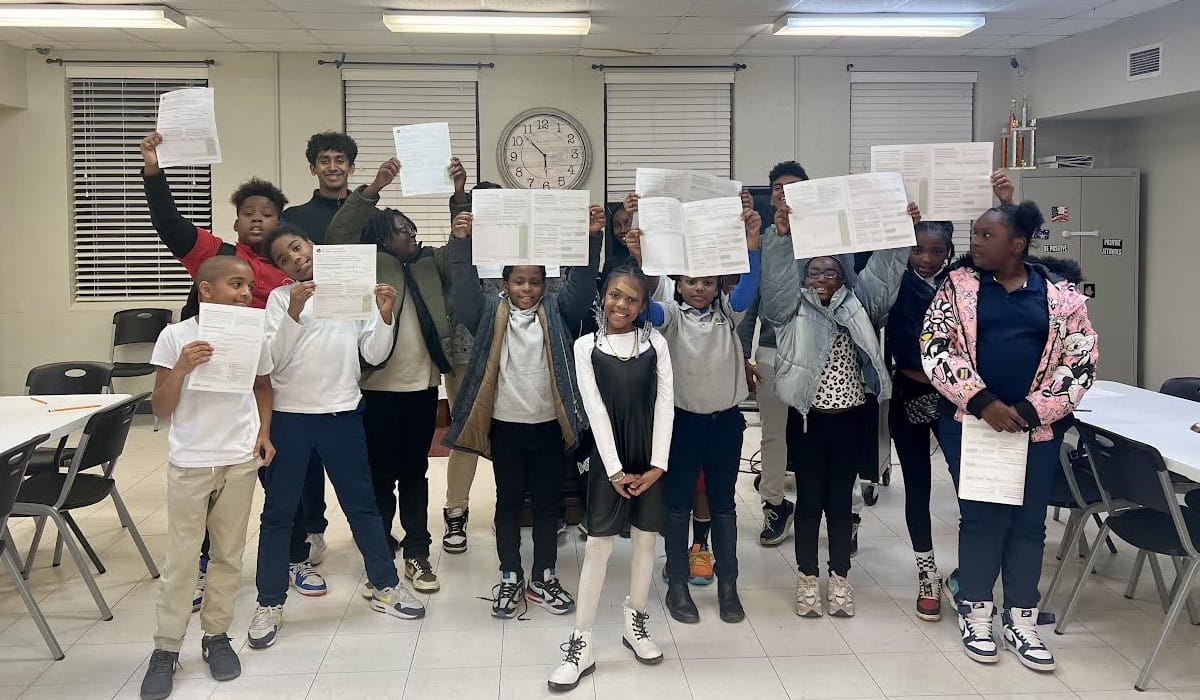Growing Piggybanks: Promoting Youth in Finance

Meet Daily Point of Light Award honoree Jay Sundar. Read his story, and nominate an outstanding volunteer or family as a Daily Point of Light.
Jay Sundar founded Youth Finance USA, a nonprofit based in Charlotte, North Carolina, teaching financial literacy to students from kindergarten to 8th grade. Jay’s nonprofit has partnered with two primary school districts: Charlotte-Mecklenburg Schools and New York City Public Schools. Youth Finance USA is also present in six states and plans to expand to more states throughout the United States.
His partnership with Charlotte-Mecklenburg Schools has provided financial literacy resources to almost 40,000 elementary students in 118 schools. His nonprofit provides workshops and financial literacy resources to every Charlotte-Mecklenburg Schools Title I family, providing 50,000 students and families access to economic resources. Youth Finance USA has also partnered with the local Boys and Girls Clubs reaching 1,000 students. Jay has managed to raise $125,000 annually through Google Ad Grants and donations.
Jay is a high school student passionate about finance who looks forward to pursuing Economics upon graduation. Aside from all things finance, he enjoys playing varsity tennis and debating on his school team. When he finds the time, he enjoys keeping up with the stock market and most importantly, helping others.
What inspires you to volunteer?
The idea of getting involved in any community or a specific community or group of people inspires me to volunteer. When you get involved, you learn more about yourself. Everyone has self-achieving goals, but at the end of the day, getting involved is one of the most important parts of human nature. I’ve always been inspired to use my knowledge and resources to get involved in the community.
Tell us about your volunteer role with Youth Finance USA.
I founded Youth Finance USA two years ago during my freshman year in High School. I am the president and founder of this nonprofit. I run almost every operation, which I never expected, but find eventful. Teaching others about financial literacy is something I am passionate about. Of course, there are good and bad times, but this is manageable.
Initially, I did not know all that goes into starting a nonprofit, but I grew with the organization as time passed. My role includes attending boarding meetings, creating curriculums, managing the financials, doing administrative work and, most importantly, overseeing my team of volunteers.

What inspired you to get started with this initiative?
I live in Charlotte, North Carolina and we have the lowest social mobility in any city in the United States. As a result, the government passed a bill requiring all high school students to take a finance class before graduating high school. However, from my perspective, financial literacy can be taught much earlier in life, particularly from age 7.
So, I started teaching kids financial literacy at a local school, which eventually developed into a nonprofit organization. Today, we partner with Charlotte-Mecklenburg Schools and New York City Public Schools to teach their elementary school students lessons on financial responsibility. Youth Finance USA creates its curriculum, worksheets and presentations, which are then delivered to tens of thousands of students. We also run our summer camps and online programs focused on financial competence.
What are your long-term plans or goals for the organization?
I enjoy our work in Charlotte-Mecklenburg and New York City Public Schools systems, but there’s always room for more. I would like to strengthen our partnerships and expand into new ones nationwide.
We already facilitate our programs during the school year and summer, but now we want to expand to more states and partner with more organizations. We must continue developing more institutional partnerships with school districts to deliver our curriculum to more schools in various states.
What’s been the most rewarding part of your work?
The most rewarding part is when students feel they are not learning much because they enjoy what I teach them. Learning can be fun, and I always try to make it an excellent experience for them. I love interacting with students, and the ability to educate them on life’s essentials is genuinely heartwarming. I enjoy seeing the smiles on their faces. I think from the perspective of a high schooler, I have a remarkable ability to connect with students and this allows me to learn more about them; it makes a significant impact at the end of the day.
What have you learned through your experiences as a volunteer?
I’ve learned a lot about the nonprofit sector, what it is and how to run it. It taught me about the importance of leadership and the ability to recruit other volunteers. Also, I thought I knew everything I needed about financial literacy, but this allowed me to gain the necessary tools to teach and connect students to succeed.
I’ve mastered almost everything, from tax filing to interpersonal skills such as networking. Now that I know, I teach others how to present themselves to city officials or partners, people who one day want to run big organizations. Now, I can attend meetings with those I’ve trained, where we pitch Youth Finance USA to other organizations and build connections. Altogether, this has been an ongoing process of learning.

Tell us about future partnerships, programs or events that you are excited about.
Right now, I am excited about our upcoming event with Charlotte-Mecklenburg Schools. We plan to provide more resources to Title I families and students on the importance of financial literacy. Our curriculum is distributed to 18 elementary schools in the Charlotte-Mecklenburg district through training videos for thousands of teachers, and I hope it continues to expand.
I’ve already been on numerous entrepreneurship panels within New York City Public Schools and plan to be a part of many more, discussing how to be a social entrepreneur. And lastly, we plan to continue a few more afterschool programs this year, including expanding through Manhattan and Brooklyn Public Schools.
We also plan to grow our program and partner with a nonprofit in India to teach financial literacy to a few Indian students.
Why is it important for others to get involved with causes they care about?
A big part of getting involved is finding who you are and learning how you can get involved. Once you understand who you are, you’ll find plenty of causes that excite you. Everyone should take steps to get involved. If you care about them, it is important to do so because there is no better reward than seeing the work you’ve done making a substantial impact on your community or worldwide.
Any advice for people who want to start volunteering?
Start by looking up volunteering opportunities near you. Put your foot in the water and volunteer just once, it will make a difference. To start a nonprofit, you must know it will take substantial planning. But if you find a cause dear to you, you can start small and then continue to build from there. The important goal is to build your impact.
What do you want people to learn from your story?
No matter your age or skill set, you can make a difference if you care. A lot of people are scared, feel they don’t have the time or don’t think they will make some sort of impact. None of this is true. I was 15 years old when I started. I started small and look what it has grown into now. Age shouldn’t be a barrier. If you work really hard and care about something, you can make it change happen.
Do you want to make a difference in your community like Jay? Find local volunteer opportunities.
